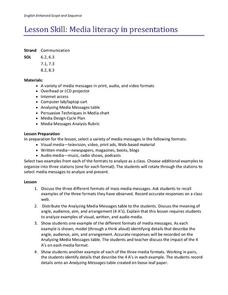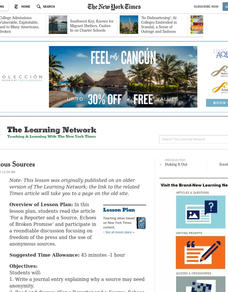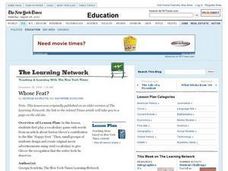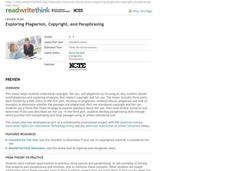EngageNY
Notices, Wonders, and Vocabulary of the Third Stanza of “If”
How does one's experience reading a poem's text differ from listening to its audio version? Delve into the insightful question with the poem, If by Rudyard Kipling, as pupils compare and contrast their experience using a note-taking...
Curated OER
Briefly Noted: Practicing Useful Annotation Strategies
Post-It notes, highlighting, underlining. Sam Anderson’s New York Times Magazine article, “What I Really Want Is Someone Rolling Around in the Text,” launches a study of “marginalia,” or writing thoughts in the margins of a text. After...
The New York Times
Collateral Damage? Researching a Connection Between Video Games and Violence
Hook your class into an exploration of and discussion about violence in video games with a cute animal clip and a video game trailer. After a quick discussion about how media can affect mood, class members read a related article and...
Curated OER
Give Me Liberty or Give Me Freedom
Welcome to America, the land of liberty and freedom. Examine the ways in which the terms liberty and freedom have been used in the United States. After researching and analyzing quotations from the past and present, students create an...
Curated OER
All in a Day's Work
Who is Herman Melville? Read and discuss "Bartleby the Scrivener: A Story of Wall-street." Then, discuss the film adaptations of Melville's work and translate a passage of the text into modern-day English. Discussion questions are...
Curated OER
Media Literacy in Presentations
Middle schoolers study the three types of mass media messages: visual media, written media, and audio media. After a class discussion which has them list examples of each, learners get into pairs and work on analyzing the "Four A's" in...
Curated OER
Press Review
How can word choice affect a political speech? Middle and high schoolers examine the text of the 1999 State of the Union Address, and then determine how newspaper articles and television reports describe and analyze the event. Use this...
Curated OER
Word Up!
Study the importance of word choice in informational text. Middle and high schoolers locate unfamiliar words and phrases in newspaper articles of their choosing, and use online word sites to explore the definitions and histories of each....
Curated OER
Loose Lips
Have your middle and high schoolers analyze instances of celebrities using racial slurs or making prejudiced comments in public. After reading an article, they consider the roots and effects of prejudice and bias. As a class, they...
The New York Times
Big Brother vs. Little Brother: Updating Orwell's 1984
Government surveillance is an enduring conflict that has become increasingly complex with our nation's use of technology. Add to the understanding of Orwell’s 1984 by using the resources here that display the contemporary actions of Big...
Curated OER
Anonymous Sources in the Media
When do people ask for anonymity? Why? After reading the New York Times article "For a Reporter and a Source, Echoes of Broken Promise," young readers participate in a roundtable discussion focusing on freedom of the press and the use of...
Curated OER
Expressing Your Views to the Letter
Analyze the motivation, purpose, and value of letters to the editor by examining letters written in response to the violence at Columbine High School. For homework, middle and high schoolers write their own letters to the editor about an...
Curated OER
Right to Remain Silent(?)
Learners consider the rights of journalists regarding source confidentiality, then create presentations on the New York Times' use of sources. They write guidelines to aid journalists in evaluating the trustworthiness of their sources.
Curated OER
Is That a Fact?
Investigate popular scientific claims and gather evidence to defend or argue against an author's stance. Writers synthesize information and compose their own "Really?" columns modeled after those found in the weekly "Science Times"...
Curated OER
Whose Feat?
Play a vocabulary game with words from an article about Savion Glover's contribution to the film "Happy Feet." Then, small groups of students design and create original movie advertisements using vivid vocabulary to give Glover the...
Curated OER
What a Relief!
How are disasters addressed by the Federal Government? This New York Times lesson, based on the article "Disaster Aid: The Mix of Mercy and Politics," prompts middle schoolers to discuss the idea of using a disaster declaration as a...
Grand View Library
Grandview Newspaper
Get your young journalists above the fold with a set of lessons about newspapers. Kids focus on writing articles using the 5 Ws before creating a slide show presentation and blog entry to publish their writing.
ReadWriteThink
Exploring Plagiarism, Copyright, and Paraphrasing
Plagiarism, copyright, and fair use are the focus of a three-part instructional activity designed to inform scholars of how to properly cite others' work. First, pupils use a KWL chart to begin thinking and discussing plagiarism. They...
The New York Times
Stress Less: Understanding How Your Mind and Body Respond to Anxiety
What could be more relevant to teens and preteens than experiencing stress? Use an article from the New York Times website to practice valuable Common Core skills for informational text reading, and also get a discussion going in your...
Curated OER
A Test of Faith
Secondary schoolers investigate the debate surrounding the current sexual abuse crisis in the Catholic Church with this New York Times lesson. Through discussions and written reflection, they explore their own thoughts and opinions on...
Curated OER
Shame on You!
Should public humiliation be an acceptable consequence for a crime? Have your middle schoolers engage in a round table discussion about the recent resurgence of the use of public humiliation as a punishment for crimes in the United...
Curated OER
Who Could Have Been Who
Can word choice affect a candidate's likeability? Use a New York Times lesson to explore how a presidential candidate's likeability factor can fluctuate in public opinion polls. Young readers choose a presidential election from their...
Curated OER
Recurring Nightmares
Does history really repeat itself? Encourage your middle and high schoolers to answer this age-old question by reading the attached articles on the Cuban Missile Crisis of 1962 and the Iraq Crisis of 2002. How similar or different are...
Curated OER
The First (and Last) Words
What does "freedom of speech" mean to your class, especially in the context of Internet communications? In round-table discussion format, middle and high schoolers address the issues discussed in "State Legislatures Across U.S. Plan to...

























